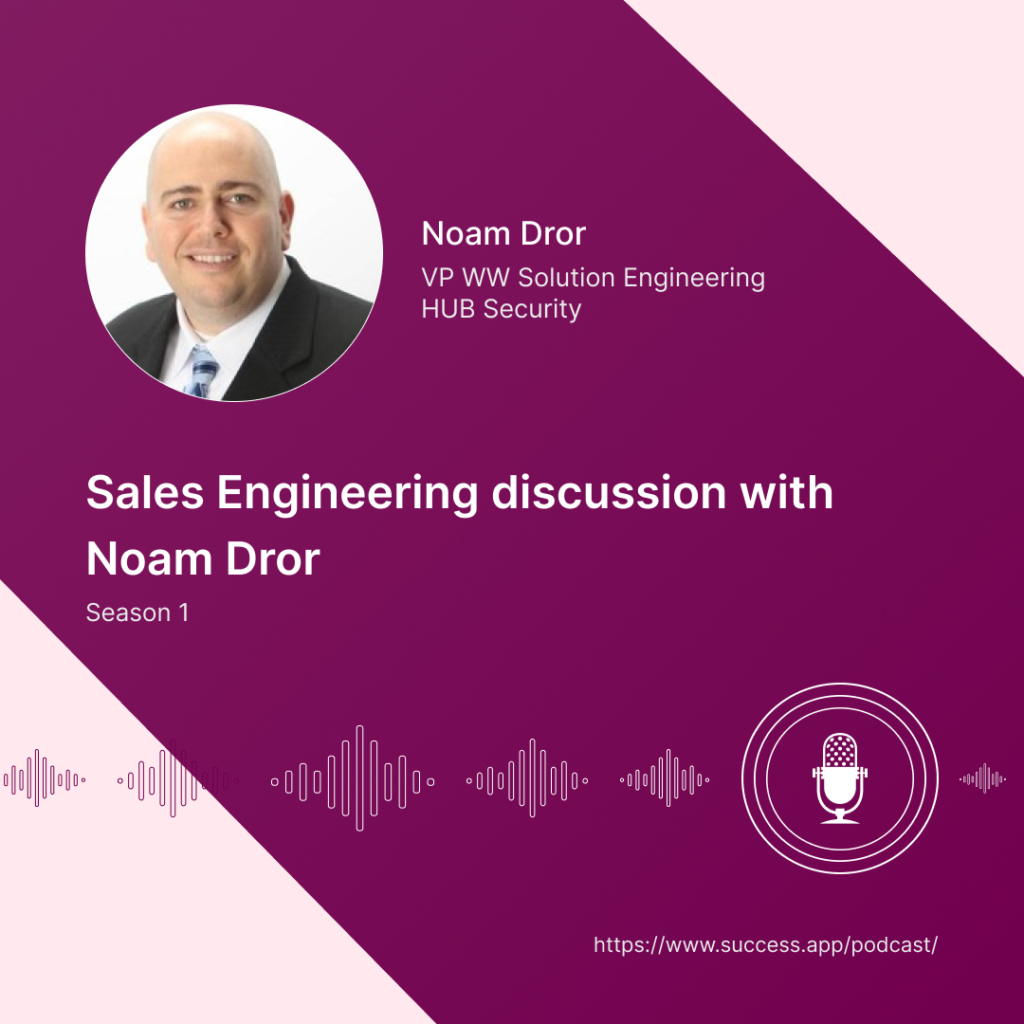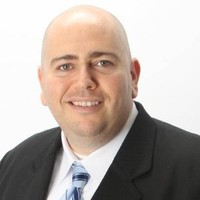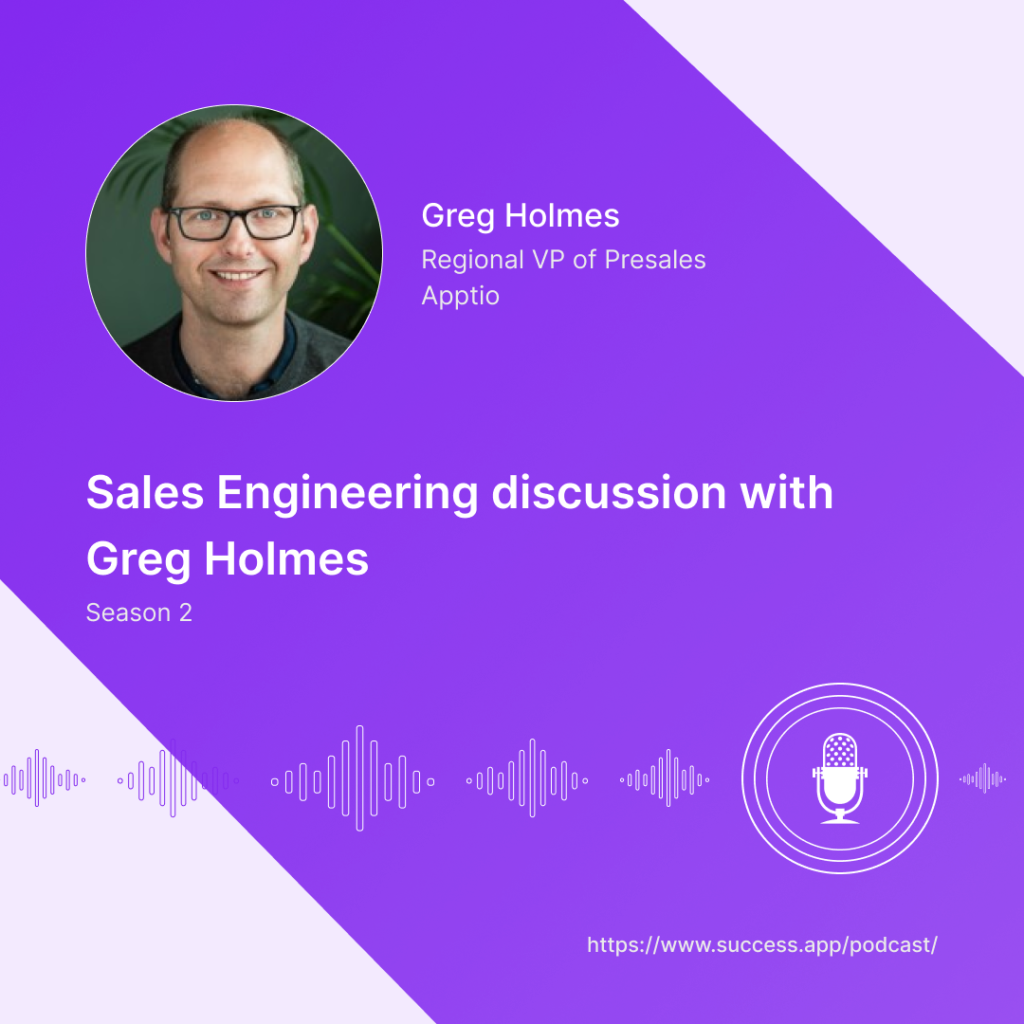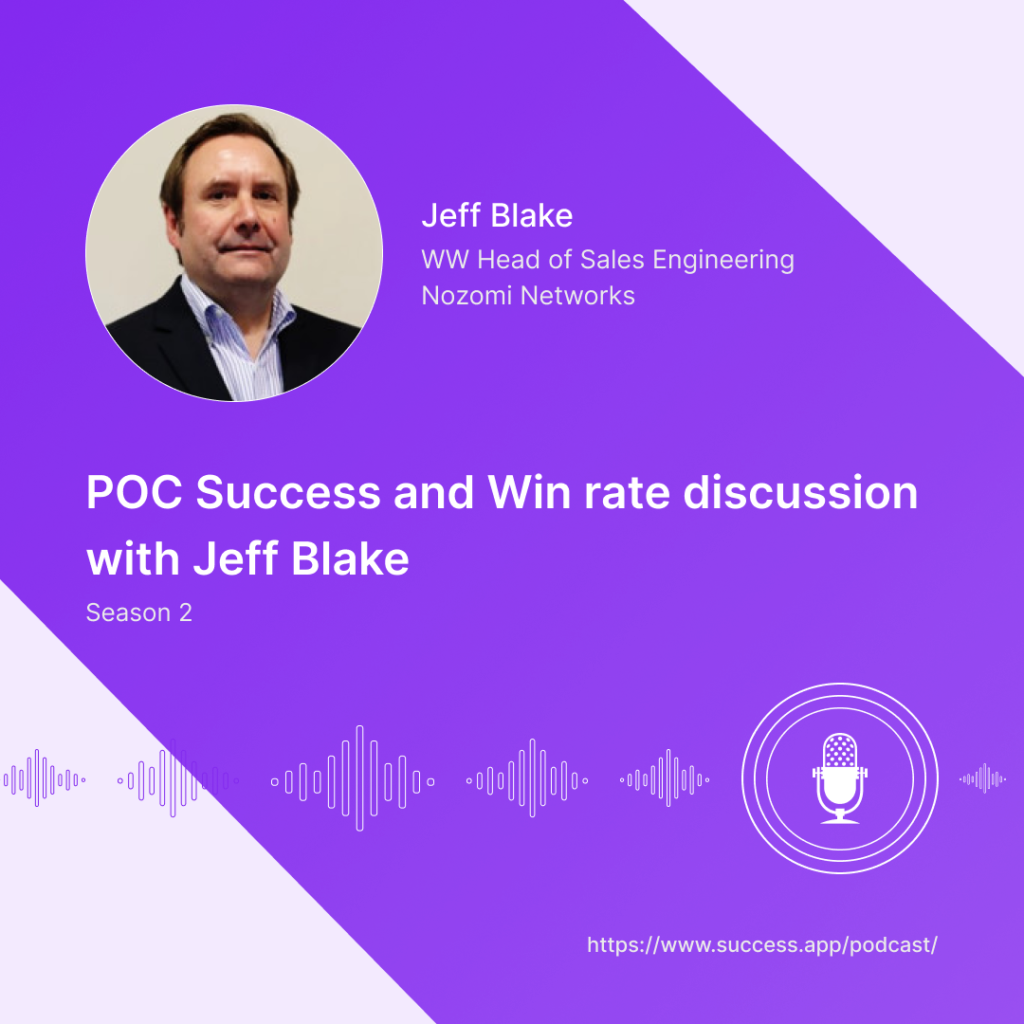

VP WW Solution Engineering at HUB Security
In this episode, Noam Dror joins the discussion. Noam is VP WW Sales Engineering at Privitar and he comes with extensive experience of building SE teams. Vik and Noam discuss on various sales engineering topics such as proof of concepts, building sales engineering teams etc.
[00:00:00] Intro: Welcome to podcast for Sales Engineers, Proof is in the Pudding. This podcast is brought to you by smart POC platform, Pudding.app and I’m your host Vik Arya.
[00:00:12] Vik: For this podcast, we bring you Global VP of Sales Engineering at Privitar. We have Noam Dror in our show today. Noam has built and managed worldwide sales engineering teams for many, many startup.
[00:00:24] And I’ll ask Noam to introduce himself.
[00:00:27] Noam Dror: Perfect. Thank you so much, Vik. Uh, happy to be here. Uh, and maybe I’ll introduce myself first. Uh, Noam Dror, uh, I’ve been in the IT and cybersecurity, uh, industry for a long time. I started my career in Israel, actually in my military service when I was, uh, running a large team of, um, IT, uh, system integrators and developers.
[00:00:50] Uh, so I had that privilege at the age of 21. And since then, I went through different companies, small, large system integration technology companies. Recently I joined Privitar, who is a, um, data privacy technology, uh, that is really around helping customers protect their sensitive data, uh, for data analytics, machine learning, uh, business intelligence and DevOps, uh, operations, uh, very excited to join this company and, uh, start, uh, really growing the team very rapidly.
[00:01:22] Vik: I know you have been traveling all over the place and you are here, so it’s good to catch up with you. And I want to get into more into a sales engineering processes, because I want to get some input from you about, from your experience, what are some of the key components and best practices you follow? Or you can talk to a tell about our listeners, about running a proof of concept.
[00:01:44] So when let’s say, when you go into proof of concepts, what are some of the key things that the SEs or the people who are managing the team should follow what you have seen working in the field.
[00:01:54] Noam Dror: Yeah, I would say there are three main components to running a successful POC. Uh, the first one is really preparation, a lot of preparation, understanding of the business use cases, the technical environment, the technical requirements, and having a lot of agreements from the customer around what we’re going to do.
[00:02:14] How are we going to do it? Who’s going to do what what’s the timing? So, preparation is key. Uh, the second part, is around connecting it to business, uh, requirements, if you’re running a POC, but you’re not solving a business problem, then you might have a successful POC, but you won’t close an opportunity.
[00:02:30] So we have to always be sure that we connect anything we do to a business problem.
[00:02:36] Vik: Right. Actually, that you made a very good point. I mean, at the end of the day, the purpose of POC is not to run the POC, but to close the POC. That’s what is our goal we want to achieve. So, uh, how do you think sales engineers can, convert that in a win?
[00:02:50] So, we do the POC we show what we can to our customers. Usually when we set a success criteria, we already know that that criteria that we can set up, otherwise, why would we go into the POC with that.
[00:03:00] Noam Dror: Right.
[00:03:01] Vik: But how do we make sure how, what SEs can do better during the POC to make sure that the outcome is the positive and they win the POC at the end, they have a technical win in the POC.
[00:03:12] Noam Dror: First thing is really create good relationships within the team, uh, that is evaluating the POC. We need to make sure that we have the right stakeholders. Uh, because we usually talk with one team, but other teams needs to know at least know about it. If not, if not being fully involved. We need to make sure that they are comfortable in a trust.
[00:03:33] They have this trust that we can make them successful. So POC is not just to prove a technology, it’s really to gain some trust from the different teams within the customer, the, the technology and the company and the team can make them successful in solving their challenge.
[00:03:50] Vik: Right. Actually, you mentioned a very good point.
[00:03:55] Uh, that in the customer, we need to build a relationship with the customer. We need to keep the customer informed of what we are doing. So that is actually one of the thing that we do in the Pudding also to let people know consistently throughout the process, when they’re running the POC, how does going, what is the status?
[00:04:11] What all has been done? Because usually what happens is, we start POC we define all the criteria is, is, goes into the email. And it is buried somewhere down and nobody takes a look. And three months later, SEs go back to the customer and say, Hey, we have finished a POC. We have proved the success criterias, and customers said, Oh really?
[00:04:29] And they don’t perceive the value. So, I think you made a very good point that a, you know, customer need to be engaged. They need to be informed what all going on so that they continuously informed and at the end they feel that yeah, I have achieved what I wanted to achieve. So that’s a very good point. I want to digress a little bit about, about the building the teams.
[00:04:46] I think for a lot of people who are in the sales engineering leadership, they, building the team is very common. They want to quickly ramp up the teams and build really team that works. How has been your experience? How do you do it? You have done for many companies. How do you do it? How do you build the teams?
[00:05:01] Noam Dror: Yeah, I think this is, uh, one of the most important things that I learned in my career in order to be successful, you really have to have a successful team that knows how to work together. And I see two types of good sales engineers. One type is those A-players that are lone wolves who are very good at what they do, but they’re not able to share, coach, mentor and get other sales engineers as good as they are so they can make the job done.
[00:05:31] But it will not, you will not have a good team that you can grow and be successful with. Um, and that usually creates kind of a negative culture, uh, for the team. The other types of, uh, A-players that are, you know, very good sales engineers are sales engineers that know how to work with customers. They have good hands-on skills.
[00:05:51] They have good communication skills, they understand everything, but they also understand that in order for them to work better, have better work-life balance have better career progression. They really need to teach, mentor others, share their data, take their learnings and make something out of it. Right?
[00:06:10] Create work product that is, uh, being shared with the team and being taught to the team and then work very well with the other stakeholders within the company. If it’s sales, if it’s services, if it’s support, customer success. So, there are different entities within every company that you want to work with in order to make, uh, the business even better and more successful.
[00:06:31] Vik: Yeah, makes sense. Talk about the lone wolves. There are SEs who are lone wolves and they just like to work there. They are great in technology and they do great, but then there are some time the challenges are how we, you know, how the SEs work very well with the account executives. In some cases, there are one-to-one pairing, but some cases, some companies, they follow the pool where you are working with multiple account executives.
[00:06:51] Typically, what your experience has been, how do you make sure that the team is really like working well with each other? They don’t have much friction.
[00:06:58] Noam Dror: So, two things about that so before I talk about how, uh, you should work with the account executives, and what’s the process I think in that are key for a successful team is to have good diversity on the team.
[00:07:10] So, uh, and diversity in different areas. So, it’s not just about gender or ethnicity or location or age. The diversity needs to be diversity of backgrounds, diversity of ideas and diversity of experiences. Right? So, for example, for my team right now, even though we are doing the privacy for big data, most of my team members are in the big data space, but I’m looking to diverse the team to bring someone with some cyber security experience and some compliance experience, uh, to just add more kind of experience once you have that.
[00:07:44] I think that’s why my, my answer to your next question is, uh, I like to assign a group of people to a group of account executives and not have just one to one relationship, because then I can really leverage the diversity of the team in terms of experience and background to do the right thing at the right time.
[00:08:05] If I have someone who can talk very well and present very well, and they need to talk with a compliance team or cybersecurity team, then I have the right person to do that. If I have someone who’s very good at hands-on and very good with a big data environment. Then I can use that person to do that. Uh, and we can work as a team.
[00:08:22] So even though me, I might have one leader per opportunity, that one leader can actually get help from the rest of the team to make sure we’re doing the right thing for the customer.
[00:08:31] Vik: Wow. That’s a great insight. And, um, now I want to move a little bit on a different side, have some lighter questions for you.
[00:08:40] So you have been in sales engineering for a long, long time. Have you discovered any, any hacks or any, any kind of shortcuts that make things more efficient for sales engineers as well as for the people who are managing the team such as yourself?
[00:08:55] Noam Dror: Yeah, so a few things, uh, one, I like to make sure that, uh, for hiring, for example, I always check references, understand what their you know, closest people think about those candidates.
[00:09:08] Are they really good at what they do? How do they work with each other? So, I really like to do reference calls, to make sure that we understand who those people are. So that’s for the managing of the team. Uh, then in terms of, uh, working with the team and, you know, uh, hacks for sales engineers, I usually start with, you have to give examples.
[00:09:28] So when you talk about functionality, when you talk about your product, you’ll always need to give examples about how other customers are using it and why it’s important for them. That’s so important for our audience to understand why are we doing what we’re doing? And what’s you know, what’s worth it for me.
[00:09:46] Why, why is it important to me why it’s important to my peers in the industry? So that that’s a big, important hack.
[00:09:53] Vik: Now, I want to come to a question that I’m sure many of our listeners would be interested in, especially the ones who are managing the teams. And there’s always, uh, we are doing the POCs we are running this team.
[00:10:06] There are some metrics that we have to always follow. We have to report to the VP of sales or CEO’s or executive team in QBRs or sales kickoffs. What are the, some of the key uh, sales engineering metrics that you follow or you find useful in terms of tracking visibility in the POCs what’s going on and how the teams are performing, why the POCs are closing or not closing how much time.
[00:10:29] So usually, uh, are there some specific metrics that you look always when you are managing sales engineering teams?
[00:10:36] Noam Dror: Yes, definitely. So, a few things, one I would usually like to track. How we are scoping those POCs what are the use cases that are most common and where are we successful with that? So that’s why it’s so important to prepare for POCs because if you can map whether the environments you’re working with, what are the business use cases you’re trying to solve?
[00:10:57] What are the technical use cases you’re trying to deliver? If you can track that and you have the results of those POCs, you know, which POCs you should try, you should really target, right? Because you might have one environment that you’re better at than others. You might have a business use case that is more successful than others.
[00:11:15] You might have a technical use case that you’re better in delivering than other use cases. So, when you learn that it’s easier than to go to POCs and win more of them, and then you know, convert into a, win into a business for both the customer and the company.
[00:11:31] Vik: That’s great. And, but how to define the objectives for sales engineers, because typically in the sales team, both for sales and sales engineering, we are mostly driven by the quota, the targets.
[00:11:43] Those are the biggest metrics that we have, but those cannot be the only metrics that we can track sales engineering on. So how do you, what’s your lookout, what’s your strategy in terms of defining the objectives of sales engineering? If let’s say today, there is a sales engineering manager or director or VP is thinking about.
[00:12:01] How should we define the objective for this year, this quarter? Uh, apart from the setting, the quota, giving them the target, what are the objectives they should be looking at?
[00:12:11] Noam Dror: Right. And that needs to be planned. And those goals need to be set in advance. And I also like to make sure that, you know, the proof is in the pudding.
[00:12:19] That means we are actually incenting people to work on those goals. So I’m a big believer in MBOs of course, most of the compensation for SEs needs to come from closing deals. That’s the largest part of, of the variable. Uh, that SEs are being compensated for, but I like to leave some of the variable for MBOs and those MBOs would, incent getting to the goals that are not just closing deals.
[00:12:45] So that will be self-improvement that it would be, you know, buzzing the industry, communication, blogging. If your team is responsible for partners, that will be part of partners. If your team is responsible for customer success and supporting the customers after the sales then that would be part of those MBOs.
[00:13:03] So those MBOs are really important and it’s really important to have, you know, one-on-ones that are scheduled weekly or monthly or something like that. And review those goals at least on a quarterly basis, just to see where we are.
[00:13:15] Vik: Wow. That’s great. Yeah, I think great insight. Now I have some personal questions for you.
[00:13:20] What are, what is the last book based on technology, non-technology, self-help, productivity, non-fiction or pretty much the book that you read recently that you want to share and what you like, what did you like about it?
[00:13:33] Noam Dror: Yeah, well, not recently, but I think one of the uh, best books I read that helped me is, uh, this, The Challenger Sale and, you know, one of the, you know, key things I learned from it is that you always need to ask why and why you need to change. Uh, so, you know, as SEs, we like to be the good guys. We’d like to answer all of the customer questions. We’d like to show that we know everything, but really, we need to understand why something is important to the customer.
[00:14:03] And if we understand why it’s important, it’s a lot easier for us to show them, you know, what they want to see, uh, because, you know, when someone asks me, can you do this? I can answer yes, I can answer it yes and this is how or I can answer that’s a very good question we have another customer that did something like that.
[00:14:22] Is that why you’re asking the question or is that important to you? So, answer a question with another question, just to verify more. And then once you understand really the reason why it’s important for the customer, you will have a way better answer for them and a way better method to show them that you can deliver on what they need.
[00:14:40] Vik: Very cool. Very cool. So, I have one last question for you. Uh, as a sales engineers uh, we love using tools and apps and whatnot. Do you have any tools or applications that make your life easier that you think are like, must have for people who are in this role or, you know, working with customers all the time, flying here and there all the time, one or more applications or tools that you find really useful.
[00:15:04] Noam Dror: Uh, for sales engineers, I think, uh, it will be really depending on what you’re doing. So, on the technical side, it depends on the industry and, uh, the vertical you’re working with. Right. So, so it depends on the technology. Uh, it’s also depends on what type of company you work for. So, uh, you understand it, I’m a big believer in relationship.
[00:15:26] So a lot of travel is required when you do sales engineering, because it’s important to see your customers. I’m sure a lot of the apps are travel related. It’s that’s one thing. Uh, and then. Uh, I’m a big believer in, you know, taking notes. So, uh, you can always go back and see what happened in the past, who you’ve been in contact with.
[00:15:48] Uh, when did you, when did you do your last contact? Uh, what do you know about a specific customer? So, I usually take notes and say, Hey, this person likes football, or this person likes, uh, I know a, uh, movies, or we talked about a specific holiday they like, or something like that. And it just reminds me, you know, outside of what we need to talk about the technology or the solution.
[00:16:15] Uh, what else would they like to talk about?
[00:16:18] Vik: Awesome. Well, there you go. That was our podcast with Noam Dror. Great conversation. Thank you so much for joining us today. I know it’s a busy schedule, but you still made some time for us. So, it’s really thank you so much.
[00:16:29] Noam Dror: Thank you so much for having me.
[00:16:31] Outro: Pudding is a smart POC platform that elevates the POC experience for sales teams and their customers. Sales engineering teams use Pudding for tracking, managing, and automating POC activities. Find out more at pudding.app.

In this week's episode of Proof is in the Pudding podcast, Vik is joined by Greg Holmes, Regional Vice President of Presales at Apptio. Greg shares his views on the evolution of presales, best practices for POC, product evaluation process, his contribution to the PreSales Collective, and more exciting topics.

In this episode, Jeff and Vik discuss fundamental sales engineering activities, defining winning success criteria, POC success rate, key insights for SE's, and many other sales engineering topics.